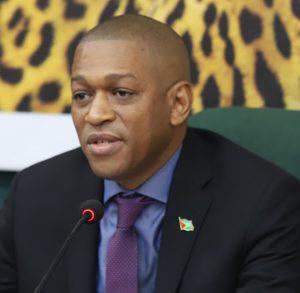Guyana celebrates First Oil without Local Content Policy
On Friday last, the Government of Guyana joined Stabroek Block partners ExxonMobil, Hess Corporation and CNOCC/NEXEN at the Marriott Hotel for a cocktail reception that commemorated Guyana’s entry into the oil producers club.
This celebration was held even as the country remains without a Local Content Policy. This document ensures maximum use of local goods, services and products, along with the transfer of technology.
For four years, the government promised that the policy would be in place before First Oil with the most recent of those promises being proffered by Energy Department Director, Dr. Mark Bynoe late last year.
The task of completing the policy was done by UK Consultant, Dr. Michael Warner. Kaieteur News would have exposed his connection to ExxonMobil in previous articles. Those news items also outlined that he was brought to Guyana by the US oil king to advise the government on local content and companies on procurement processes for the oil sector.
Furthermore, Kaieteur News would have exposed that he made alterations to the draft policy which was initially done by Trinidadian Local Content Expert and Energy Strategist, Anthony Paul.
For $22M, Dr. Warner not only removed key provisions that put Guyanese first, but also excluded from it, any recommendations for sanctions against foreign suppliers if non-compliance is discovered.
Kaieteur News was able to identify these after comparing the second draft with the one that Dr. Warner did.
In Paul’s draft, a strong case was made for ensuring foreign suppliers partner with locals. The Trinidadian said that partnership is crucial in ensuring the transfer of knowledge and technology. The International Energy and Strategy Advisor called for minimum requirements to be set for ownership through equity participation in joint ventures.
But in the draft that was done by Dr. Warner who has connections to ExxonMobil, foreign companies will not be mandated to partner with local firms. In fact, the draft policy states, “…it is the policy of the Government of Guyana to not mandate local-foreign joint ventures as a requirement for market access in the upstream petroleum sector, but instead to encourage such alliances…”
TAX BREAKS
In Paul’s second draft, the Trinidadian noted that there needs to be a level playing field when it comes to the payment of taxes, hence his recommendation that foreign suppliers should be made to pay their fair share.
Paul went as far as to outline a mechanism by which Guyana could capture taxes from the foreign suppliers. He said that the foreign companies doing business as agents, contractors, or sub-contractors to operators should be required to register a local company and pay taxes in Guyana.
In Guyana’s third draft, however, Dr. Warner removed this provision. In fact, not a single suggestion was made for locals to get the same tax breaks as the foreign suppliers so that they can have a fair shot at being competitive.
CONFIDENTIAL
In addition to removing provisions that level the playing field for tax payments, Dr. Warner went a step further by proposing that the local content plans of foreign companies be protected by confidentiality provisions.
Dr. Warner specifically stated that the Business Minister shall only disclose to the general public, whether or not; operators have submitted yearly Local Content Plans and half-year and end-year Local Content Reports. Other than that, the Business Minister must keep the contents of plans under wraps.
In Paul’s second draft however, no such call was made.
In fact, the Trinidadian’s draft policy is the only one that is in conformity with a report from the United Nations Development Programme (UNDP) which called for tax breaks for local companies and joint ventures between locals and foreign suppliers, among other things.
Dr. Warner’s draft policy is essentially, in complete defiance of the UNDP’s recommendations.






















